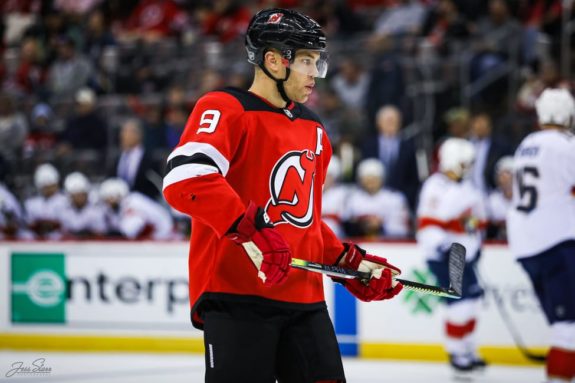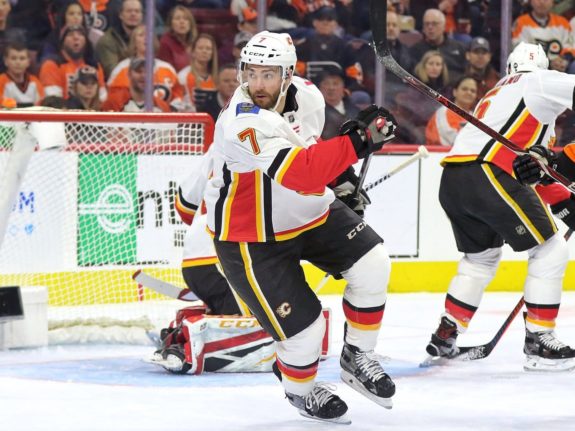Picture for a moment – as many fans have – Taylor Hall in a Calgary Flames’ sweater come the 2020-21 NHL season. The star winger is an impending unrestricted free agent (UFA), and the Flames project to have the type of cap space necessary to compete for his services in 2020 free agency.

But would Hall fit into the team’s immediate needs? And could his long-term performance possibly justify the contract that he’ll command as a free agent? Unfortunately for those who dream of a homecoming for the Calgary native, the answer to both questions is no.
Taylor Hall Leads the Class of 2020 Free Agents
At this time, it remains unclear as to just when the league’s 2020 free agency period will open. The usual July 1 signing day is off the table, but whenever the signing period does begin, all eyes will be on Hall. It’s also still possible that he re-signs with the Arizona Coyotes before then, but that has yet to materialize at this time.
Related: Flames’ 5 Most Productive Defensemen of All-Time
Along with defensemen Alex Pietrangelo and Torey Krug, Hall ranks among the most coveted options who appear likely to test the open market in 2020 free agency. But at forward, Hall is easily in a class of his own, with other skilled and similarly aged wingers such as Tyler Toffoli and Mike Hoffman a clear step behind in the second tier.
The 28-year-old Hall is now two seasons removed from a 94-point, Hart Memorial Trophy-winning season with the New Jersey Devils in 2017-18. He followed that by missing over half the 2018-19 season with an injury. He then hit the trade block in the early months of the 2019-20 season, eventually landing with the Coyotes in a Dec. 16, 2019 trade.
This season, Hall’s offensive numbers were steady but well below expectations. The NHL has now officially concluded the 2019-20 regular season, so he finishes with 52 points in 65 games split between the Devils and Coyotes. He especially struggled to score early on, with just 6 goals in 30 games as a Devil.

Despite the downturn for Hall, this much remains clear: whoever signs him in free agency will need to pay up. He should command the maximum seven-year contract and possibly as much as $10 million or more per season, as Frank Seravalli of TSN suggests.
Taylor Hall and a Calgary Flames Homecoming?
As Flames fans have insisted for several seasons now, Hall could provide big-name talent to the team’s top-six forward group. In doing so, he could also spend the better part of a decade filling the net against the Edmonton Oilers—who gave up on him in a headscratcher of a one-for-one trade for Adam Larsson in 2016.
Related: The Best of ‘Mr. Goalie’ Glenn Hall
And the Flames front office has shown interest in Hall in the past. When he was on the trade market in late 2019, the Flames were acknowledged as a suitor. The Coyotes eventually won the Hall sweepstakes, but this near-miss has motivated Flames fans to look ahead to the prospect of signing him in 2020 free agency. Sportsnet’s Eric Francis has acknowledged that the Flames will, in fact, kick tires on Hall in the off-season, too.
But the Flames have glaring priorities that should come before pursuing Hall. They have a bevy of defensemen who currently project to hit the free-agent market, in T.J. Brodie, Travis Hamonic, Erik Gustafsson, and Derek Forbort. Oliver Kylington will need a new contract as an impending restricted free agent as well. At least some of these pieces need to be retained for the D-corps, which is otherwise left only with Mark Giordano, Rasmus Andersson, Noah Hanifin, and youngster Juuso Valimaki.

Goaltending is another question mark heading next season. David Rittich’s performance has wavered across two seasons as the team’s starter. Back-up Cam Talbot is another impending UFA, so the Flames will be in the market for a goaltender – whether than means re-signing Talbot, bringing in a new backup, or competing for a top-tier UFA starter such as Jacob Markstrom or Robin Lehner.
The Flames also quietly shattered the myth that they don’t have depth scoring prior to this season’s March pause in play. They closed out the regular season by scoring at least three goals in every one of their final 15 games.
Taylor Hall in the Calgary Flames Lineup?
No doubt, Hall could improve the top-six forward group of any NHL team. But for the type of contract that he’ll command, there cannot be question marks. In the seasons since his Hart Memorial Trophy win, Hall has shown red flags in the form of an injury-shortened campaign and another far less productive one.
Related: The Maple Leafs and the Legacy of the Muskoka Five
Moreover, there needs to be a spot for a $10 million man to fill. Right now, the Flames don’t have a need for this type of headliner piece, especially on the wing. If general manager Brad Treliving is envisioning a massive off-season shake-up that involves the departure of a star – e.g. Johnny Gaudreau – then you could convince me that Hall is a viable option to pursue. But even then, he’s a risky play.
Some also seem to forget (or neglect) that Matthew Tkachuk, Mikael Backlund, and Andrew Mangiapane were the NHL’s best line in the weeks leading up to the pause in play. Mangiapane has emerged as, at worst, a middle-six winger, who thrived with Tkachuk and Backlund. Though he’s due a raise at the end of the season, it’s likely he’ll still represent an affordable and underrated option at wing for the next handful of years. His breakout gives the Flames leverage to bolster team defense and/or goaltending in free agency.
Gaudreau, Sean Monahan, and Elias Lindholm are additionally all locked into long-term and not unreasonable contracts. Whether or not this top-six group can legitimately compete in the playoffs is another debate, but the Flames are committed to this core at forward.
As a result, I don’t see the Flames as a fit for Hall. This isn’t to say that every member of the current top-six group is superior to Hall. Far from it. But Hall will not be worth the price tag and term that he’ll demand in free agency.
By comparison, last off-season, the New York Rangers signed Artemi Panarin to a seven-year, $81.5 million contract at an average of $11.64 million per season. At the time, he was a year younger than Hall, and he is, I would argue, a more special player than Hall. Panarin justified breaking the bank. I’m not sold that Hall, at this point in his career, does the same.

Sure, Hall’s only two seasons removed from a Hart Memorial Trophy win with the New Jersey Devils. His name still carries the dynamic reputation that he earned as a former first-overall pick who’s capable of playing at above a point-per-game pace. But if this past season is any indication, he doesn’t appear to be quite that player any longer. Nor should the Flames, of all teams, award this type of contract to a player who turns 29-years-old next season.
Calgary Flames Free Agency History Speaks Volumes
As much if not more than any other NHL team, the Flames should know better than to sign a very soon-to-be 30-year-old UFA winger to a long-term, big-money contract.
Just think back to Troy Brouwer. Is that too distant of a memory? How about James Neal—whose awful contract turned into the predicament of Milan Lucic’s contract. Scorers who are going on 30 years old are consistently proving that you can no longer award them this type of money and term.
Related: What Mats Sundin Meant to Toronto Hockey
That said, 2020 Taylor Hall is on another level when compared to the players who Brouwer, Neal, or Lucic were when they signed their contracts. He even possesses the foot-speed and power that could allow him to avoid the type of rapid downfall these players experienced. For that reason, coupled with Hall’s impressive pedigree, a team will give him a burdensome six or seven-year, $60 to $80 million contract. But that team shouldn’t be the Flames.